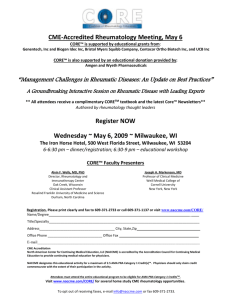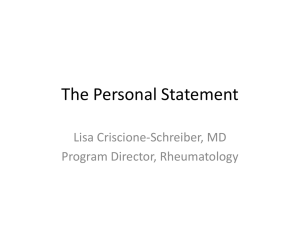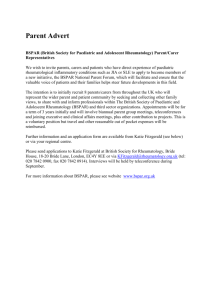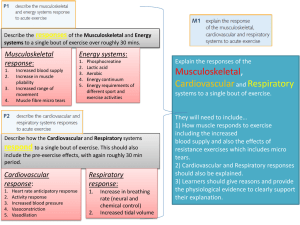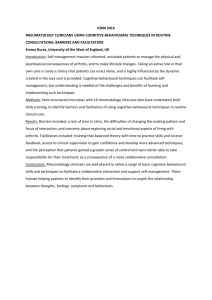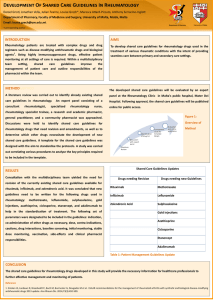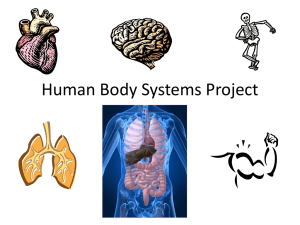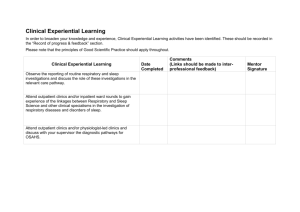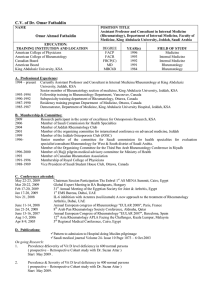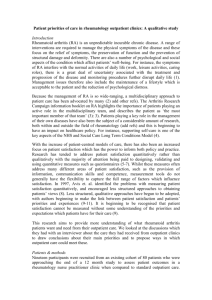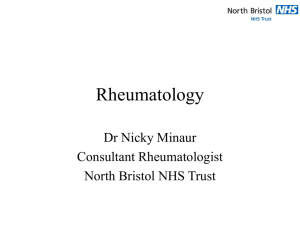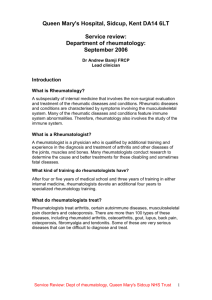General medicine
advertisement
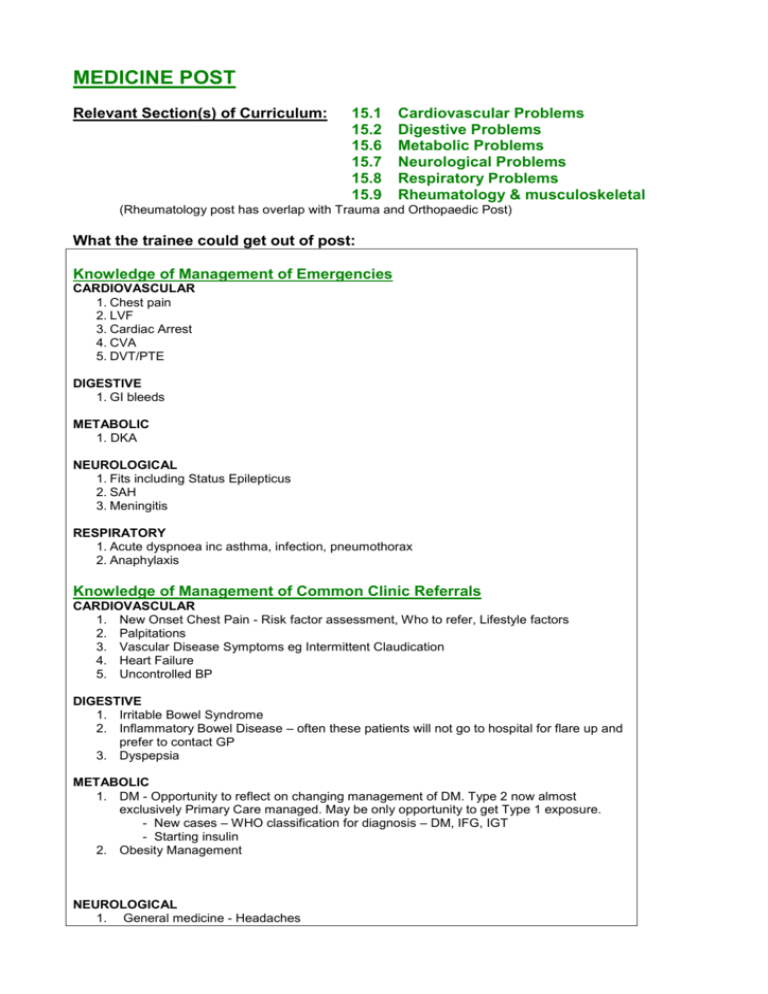
MEDICINE POST Relevant Section(s) of Curriculum: 15.1 15.2 15.6 15.7 15.8 15.9 Cardiovascular Problems Digestive Problems Metabolic Problems Neurological Problems Respiratory Problems Rheumatology & musculoskeletal (Rheumatology post has overlap with Trauma and Orthopaedic Post) What the trainee could get out of post: Knowledge of Management of Emergencies CARDIOVASCULAR 1. Chest pain 2. LVF 3. Cardiac Arrest 4. CVA 5. DVT/PTE DIGESTIVE 1. GI bleeds METABOLIC 1. DKA NEUROLOGICAL 1. Fits including Status Epilepticus 2. SAH 3. Meningitis RESPIRATORY 1. Acute dyspnoea inc asthma, infection, pneumothorax 2. Anaphylaxis Knowledge of Management of Common Clinic Referrals CARDIOVASCULAR 1. New Onset Chest Pain - Risk factor assessment, Who to refer, Lifestyle factors 2. Palpitations 3. Vascular Disease Symptoms eg Intermittent Claudication 4. Heart Failure 5. Uncontrolled BP DIGESTIVE 1. Irritable Bowel Syndrome 2. Inflammatory Bowel Disease – often these patients will not go to hospital for flare up and prefer to contact GP 3. Dyspepsia METABOLIC 1. DM - Opportunity to reflect on changing management of DM. Type 2 now almost exclusively Primary Care managed. May be only opportunity to get Type 1 exposure. - New cases – WHO classification for diagnosis – DM, IFG, IGT - Starting insulin 2. Obesity Management NEUROLOGICAL 1. General medicine - Headaches 2. 3. 4. 5. Elderly medicine – Movement disorders inc Parkinson’s Epilepsy including management first fits TIA/Stroke Multiple Sclerosis RESPIRATORY 1. Haemoptysis 2. Chronic respiratory disease – understanding of management and disease progression eg COPD, pneumonitis 3. Awareness relevant protocols/guidance – BTS asthma, GOLD, Domiciliary O2 RHEUMATOLOGY AND MUSCULOSKELETAL 1. Rheumatoid Arthritis including an awareness of the protocols/guidelines for management and referral eg DMDs – used earlier than previously 2. Breadth of rheumatology and joint pain presentations and diseases 3. Osteoporosis Specific Skills/Procedures (appropriate use of investigations) CARDIOVASCULAR Able to Perform 1. ECG 2. BP Able to Explain (Ideally should observe if not seen before) 1. Echocardiogram 2. Exercise Tolerance Test 3. Angiography 4. Doppler 5. 24hr tape DIGESTIVE Able to Explain 1. Colonoscopy 2. Upper GI Endoscopy METABOLIC Able to perform 1. BM testing 2. Ketone testing 3. Interpretation of results eg OGTT, TFT NEUROLOGICAL Able to perform 1. Fundoscopy Able to explain 1. Radiology – MRI, CT, MRA 2. Lumbar Puncture 3. Neurophysiology 4. EEG RHEUMATOLOGY AND MUSCULOSKELETAL Able to perform 1. Joint injection – large joints – knee, shoulder, golfer and tennis elbow 2. DEXA scan interpretation. Should also be able to explain procedure RESPIRATORY Able to perform 1. Inhaler techniques 2. Result interpretation – PEFR, Spirometry 3. Create Asthma Management Plans Able to explain 1. Bronchoscopy 2. PFTs 3. Pleural tap/biopsy Appreciation of the roles of others 1. Nurse specialists – have more of a community focus eg heart failure, diabetes, stoma nurse, IBD, Hepatitis C, Asthma, Rheumatology, MS. Helps develop understanding of what help they can offer to both patients and clinicians. 2. Diabetic Services – Day Unit, Podiatry, Retinal Screening, Dietetic Input, DM Clinic. Aim to attend/have awareness of what happens at each of these. 3. Weight management service – What available locally 4. Rehabilitation services eg pulmonary, cardiac, stroke – What actually happens there, what staff involved 5. Rheumatology - Specialist physiotherapy and OT – physiotherapy - focus on examination skills. Both physio and OT - understand what they can offer 6. Pain Management services – to become familiar with pain management principles and different strategies employed How: LEARNING OPPORTUNITIES IN HOSPITAL SETTING 1. Seeing Emergency Attendances and Referrals – EM, Post take ward rounds 2. Following Patient Journey – Ward Rounds, Involvement Multi-disciplinary meetings and discharge planning, Case based Discussion 3. Member of ‘Arrest Team’ 4. Attending clinics - seeing patients GPs routinely refer to OP – presenting cases and proposing management 5. Specialised Clinics (eg movement disorder, epilepsy and first fit, rapid access – chest pain/TIA, multiple sclerosis) - It is recognised that access to different clinics will vary by locale and that some areas may need to be addressed in different ways. 6. Observing or Undertaking Procedures 7. Spending Time with Nurse Specialists and AHPs 8. Vascular Clinics – may mean attending surgical service run clinics 9. Formal Teaching Sessions
